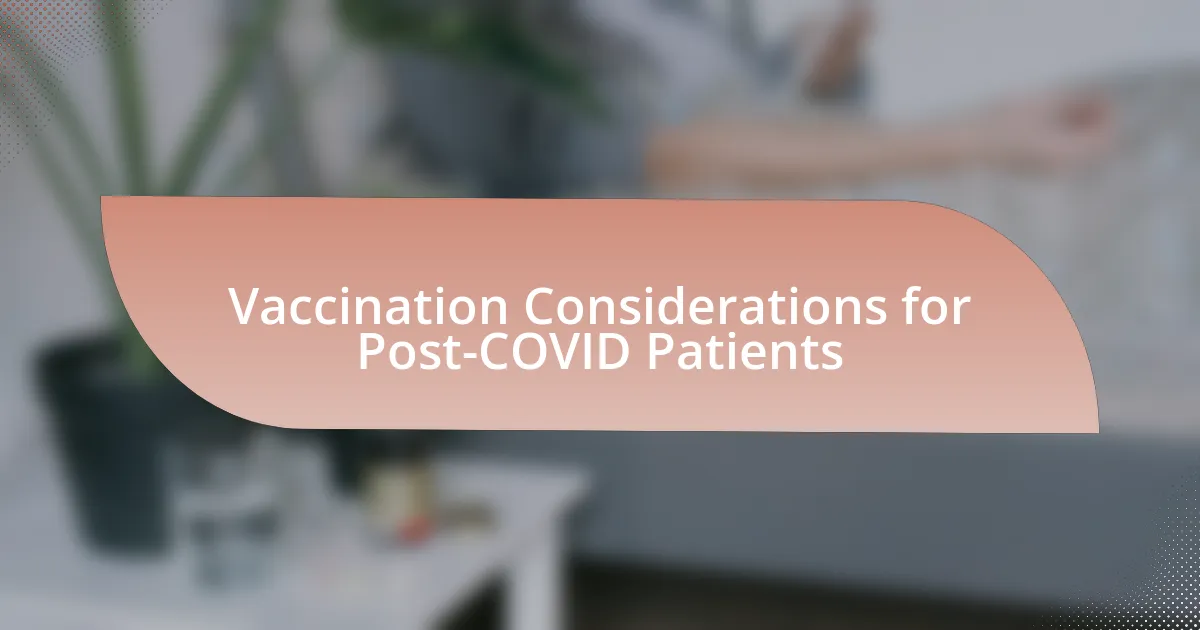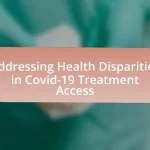The article focuses on vaccination considerations for post-COVID patients, emphasizing key factors such as timing, vaccine type, and monitoring for side effects. It highlights the importance of vaccination in enhancing immune response and providing protection against reinfection, noting that mRNA vaccines like Pfizer-BioNTech and Moderna are recommended for this population. The article also discusses the immune responses generated after COVID-19 recovery, the differences in side effects experienced by vaccinated individuals with a history of COVID-19, and the necessity of booster shots to maintain immunity. Additionally, it addresses how underlying health conditions can influence vaccination decisions and provides guidance on consulting healthcare providers for personalized vaccination strategies.
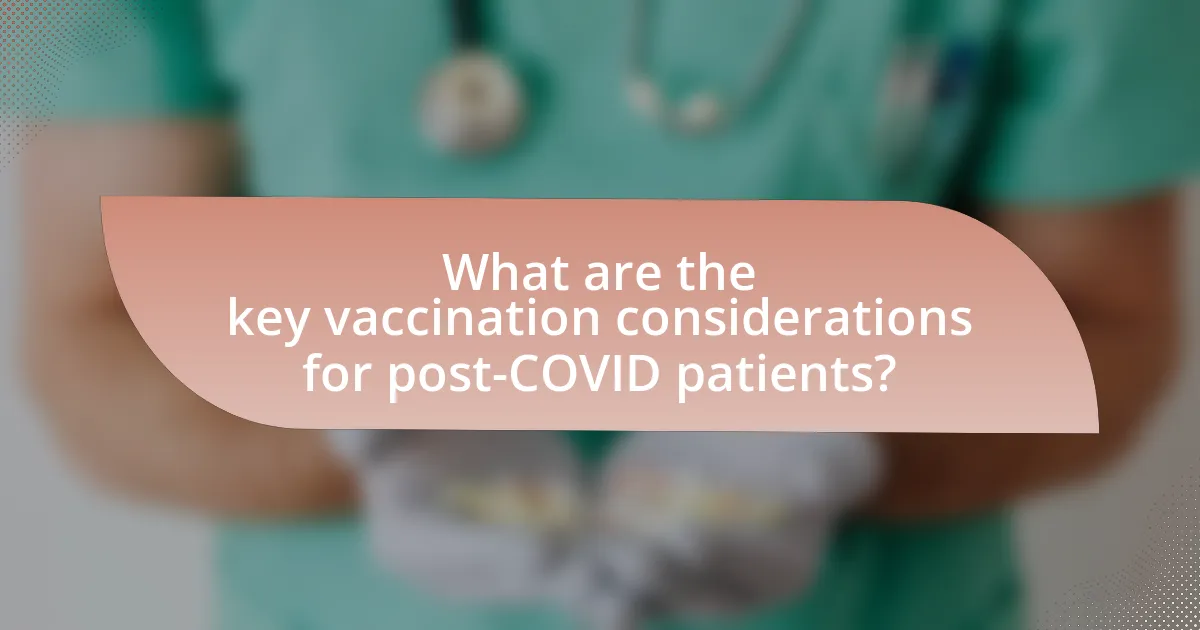
What are the key vaccination considerations for post-COVID patients?
Key vaccination considerations for post-COVID patients include timing, type of vaccine, and monitoring for potential side effects. Post-COVID patients should ideally wait at least 3 months after recovery from COVID-19 before receiving a vaccine to ensure optimal immune response. The Centers for Disease Control and Prevention (CDC) recommends mRNA vaccines, such as Pfizer-BioNTech or Moderna, as they have shown efficacy in this population. Additionally, post-COVID patients may experience different side effects compared to those without a history of COVID-19, necessitating close monitoring after vaccination.
Why is vaccination important for individuals who have recovered from COVID-19?
Vaccination is important for individuals who have recovered from COVID-19 because it enhances their immune response and provides additional protection against reinfection. Studies indicate that natural immunity from recovery may not be as robust or long-lasting as vaccine-induced immunity. For instance, research published in the journal “Nature” found that vaccinated individuals who had previously contracted COVID-19 had significantly higher levels of neutralizing antibodies compared to those who relied solely on natural immunity. This suggests that vaccination can bolster the immune system’s ability to recognize and combat the virus, reducing the risk of severe illness and complications from potential reinfections.
What immune responses are generated after COVID-19 recovery?
After COVID-19 recovery, the immune responses generated include the production of neutralizing antibodies, activation of T cells, and the formation of memory B cells. Neutralizing antibodies target the virus, preventing reinfection, while T cells, specifically CD4+ and CD8+ T cells, help in recognizing and eliminating infected cells. Memory B cells are crucial for long-term immunity, as they can rapidly produce antibodies upon re-exposure to the virus. Studies have shown that these immune responses can provide protection against reinfection, with research indicating that individuals who have recovered from COVID-19 exhibit robust antibody responses that can last for several months.
How does prior COVID-19 infection influence vaccine efficacy?
Prior COVID-19 infection enhances vaccine efficacy by providing individuals with a stronger immune response. Studies indicate that individuals who have recovered from COVID-19 and subsequently receive vaccination exhibit higher levels of neutralizing antibodies compared to those who are vaccinated without prior infection. For instance, research published in the journal “Nature” by Wu et al. (2021) demonstrated that individuals with a history of infection had a significantly increased antibody response after vaccination, suggesting that prior infection may lead to a more robust and durable immune response. This enhanced immunity can contribute to better protection against reinfection and severe disease outcomes.
What types of vaccines are available for post-COVID patients?
Post-COVID patients can receive mRNA vaccines, such as Pfizer-BioNTech and Moderna, as well as viral vector vaccines like Johnson & Johnson’s Janssen vaccine. These vaccines are recommended to enhance immunity and provide protection against COVID-19 variants. Clinical studies have shown that mRNA vaccines elicit strong immune responses, even in individuals with prior COVID-19 infection, while viral vector vaccines offer a single-dose option that is effective in boosting immunity.
What are the differences between mRNA and viral vector vaccines?
mRNA vaccines and viral vector vaccines differ primarily in their mechanisms of action and delivery methods. mRNA vaccines, such as those developed by Pfizer-BioNTech and Moderna, use messenger RNA to instruct cells to produce a protein that triggers an immune response. In contrast, viral vector vaccines, like the Johnson & Johnson vaccine, utilize a harmless virus to deliver genetic material that codes for a specific antigen, prompting an immune response.
The mRNA approach allows for rapid development and does not involve live pathogens, while viral vector vaccines can induce a more robust immune response due to the use of viral particles. Both types of vaccines have shown efficacy in preventing COVID-19, with mRNA vaccines demonstrating around 95% efficacy in clinical trials, while viral vector vaccines have shown efficacy rates ranging from 66% to 85% depending on the specific vaccine and population studied.
Which vaccines are recommended for post-COVID patients?
Post-COVID patients are recommended to receive mRNA vaccines, specifically Pfizer-BioNTech and Moderna, as well as the Johnson & Johnson vaccine. These vaccines have shown efficacy in enhancing immunity and reducing the risk of reinfection in individuals who have recovered from COVID-19. Studies indicate that mRNA vaccines can boost antibody levels significantly in post-COVID patients, providing additional protection against variants.
What are the potential side effects of vaccination for post-COVID patients?
Post-COVID patients may experience side effects from vaccination similar to those seen in the general population, including pain at the injection site, fatigue, headache, muscle pain, chills, fever, and nausea. Research indicates that these side effects are generally mild to moderate and resolve within a few days. A study published in the Journal of the American Medical Association found that while post-COVID patients may have a heightened immune response, they also reported common side effects, reinforcing that vaccination remains safe and effective for this group.
How do side effects differ for vaccinated individuals with a history of COVID-19?
Vaccinated individuals with a history of COVID-19 generally experience fewer and milder side effects compared to those without prior infection. Research indicates that prior infection may enhance the immune response to vaccination, leading to a more robust and effective immune system activation. A study published in the journal “Nature” by Hall et al. (2021) found that individuals with a history of COVID-19 reported lower incidences of side effects such as fever and fatigue after receiving mRNA vaccines, likely due to pre-existing immunity. This suggests that the immune memory established from the natural infection can influence the side effect profile following vaccination.
What should patients monitor after receiving the vaccine?
Patients should monitor for any side effects after receiving the vaccine, including pain at the injection site, fatigue, headache, muscle pain, chills, fever, and nausea. These symptoms are common and typically resolve within a few days. According to the Centers for Disease Control and Prevention (CDC), monitoring for these reactions helps ensure that any severe allergic reactions or unusual symptoms are addressed promptly, enhancing patient safety and vaccine efficacy.
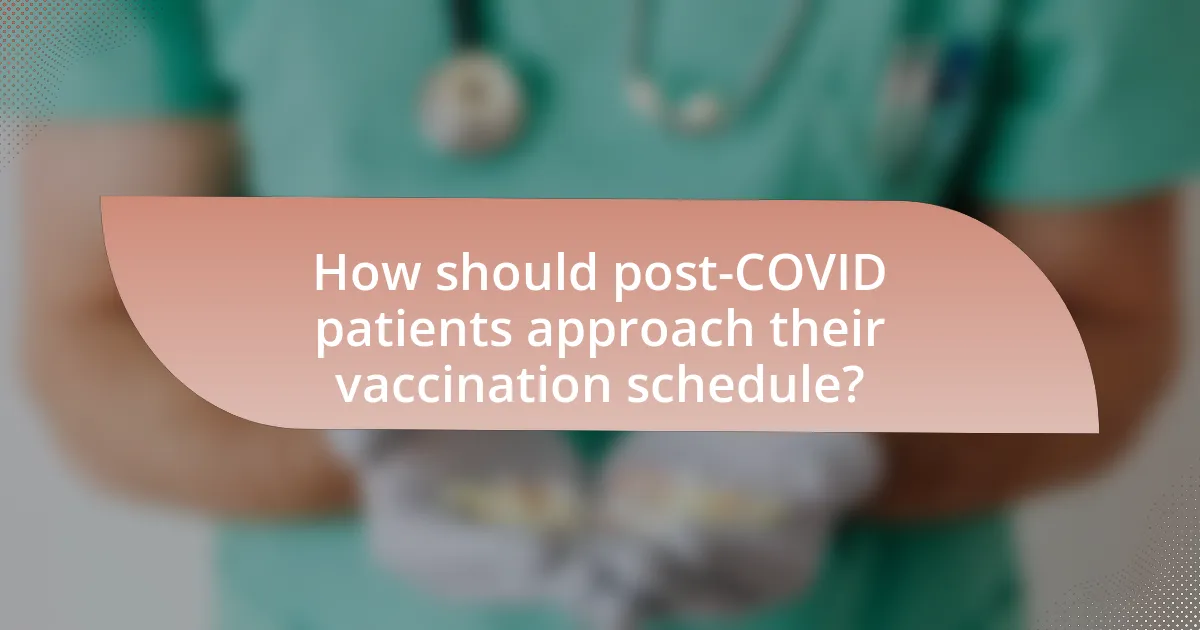
How should post-COVID patients approach their vaccination schedule?
Post-COVID patients should consult their healthcare provider to determine an appropriate vaccination schedule based on their individual health status and recovery timeline. Research indicates that individuals who have recovered from COVID-19 may have some level of natural immunity, but vaccination is still recommended to enhance protection against reinfection and variants. The Centers for Disease Control and Prevention (CDC) advises that post-COVID patients receive their vaccinations, typically starting with an initial series followed by booster doses as recommended, to ensure optimal immunity.
What factors should influence the timing of vaccination for post-COVID patients?
The timing of vaccination for post-COVID patients should be influenced by factors such as the severity of the initial COVID-19 infection, the presence of ongoing symptoms, and the timing of previous COVID-19 treatments. Patients who experienced severe illness may benefit from vaccination sooner to enhance their immune response, while those with mild or asymptomatic cases may have a longer window before vaccination is necessary. Additionally, individuals with lingering symptoms, often referred to as “long COVID,” should consult healthcare providers to determine the optimal timing based on their specific health status. Research indicates that vaccination can be effective even in those who have recovered from COVID-19, but timing should be tailored to individual circumstances to maximize efficacy and safety.
How long after recovery should vaccination be considered?
Vaccination should be considered at least 3 months after recovery from COVID-19. This timeframe is recommended to allow the immune response from the natural infection to stabilize and to reduce the risk of potential adverse effects from vaccination shortly after recovery. The Centers for Disease Control and Prevention (CDC) supports this guideline, indicating that individuals who have recovered from COVID-19 may have some level of natural immunity, but vaccination can enhance and prolong protection against reinfection.
What role does the severity of the initial COVID-19 infection play in vaccination timing?
The severity of the initial COVID-19 infection significantly influences vaccination timing, as individuals with more severe cases may experience a stronger immune response and prolonged natural immunity. Research indicates that those who had severe infections often have higher levels of antibodies, which can affect the optimal timing for receiving a vaccine. For instance, a study published in the journal “Nature” found that individuals with severe COVID-19 had a more robust immune response compared to those with mild cases, suggesting that vaccination may be more beneficial after a certain period post-infection to enhance immunity without overwhelming the immune system. Therefore, the timing of vaccination for individuals with severe initial infections may be adjusted to maximize the immune response and ensure effective protection against reinfection.
What are the recommendations for booster shots for post-COVID patients?
Post-COVID patients are recommended to receive booster shots to enhance their immunity against COVID-19. The Centers for Disease Control and Prevention (CDC) advises that individuals who have recovered from COVID-19 should still get vaccinated, as natural immunity may not provide sufficient protection against variants. Studies indicate that booster shots significantly increase antibody levels, providing better defense against reinfection. For optimal protection, the CDC recommends that post-COVID patients receive a booster dose at least 90 days after their initial infection, aligning with the guidance for the general population.
How does the presence of antibodies affect the need for booster shots?
The presence of antibodies reduces the immediate need for booster shots, as antibodies indicate prior exposure to the virus or vaccination, providing some level of immunity. However, the duration and effectiveness of this immunity can wane over time, necessitating booster shots to enhance or restore protection. Studies have shown that antibody levels decline, and variants may evade immune responses, which is why health authorities recommend booster shots even for those with detectable antibodies to ensure sustained immunity against COVID-19.
What guidelines exist for booster vaccination in this population?
Booster vaccination guidelines for post-COVID patients recommend administering a booster dose at least six months after the completion of the primary vaccination series. The Centers for Disease Control and Prevention (CDC) advises that individuals who are immunocompromised may receive an additional booster dose sooner, typically around three months after their last dose. This recommendation is based on studies indicating that booster doses enhance immunity and provide better protection against variants of the virus. Additionally, the World Health Organization (WHO) supports the use of boosters in populations at higher risk of severe disease, emphasizing the importance of tailored vaccination strategies to ensure optimal protection.
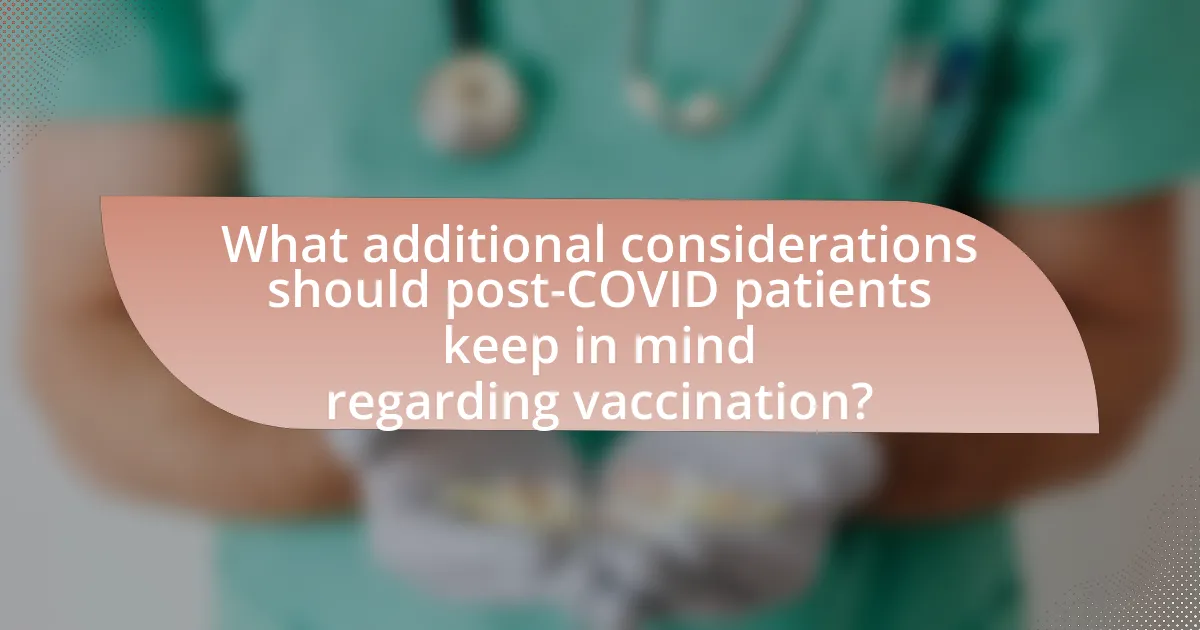
What additional considerations should post-COVID patients keep in mind regarding vaccination?
Post-COVID patients should consider their immune response and potential vaccine side effects when deciding on vaccination. Research indicates that individuals who have recovered from COVID-19 may have a robust immune response, which could influence the timing and type of vaccine they receive. For instance, studies show that post-COVID patients may experience more pronounced side effects after vaccination due to their pre-existing immunity. Therefore, it is essential for these individuals to consult healthcare providers to tailor vaccination strategies that account for their unique health status and history.
How can underlying health conditions affect vaccination decisions for post-COVID patients?
Underlying health conditions significantly influence vaccination decisions for post-COVID patients by determining the risk-benefit analysis of receiving vaccines. Patients with conditions such as diabetes, cardiovascular disease, or immunocompromised states may face higher risks of severe COVID-19 outcomes, making vaccination more critical for them. Conversely, those with specific allergies or adverse reactions to vaccine components may require tailored vaccination strategies or alternative options. Research indicates that individuals with underlying health issues are more likely to experience severe illness from COVID-19, underscoring the importance of vaccination in this population to prevent complications and hospitalizations.
What specific health conditions should be considered?
Specific health conditions that should be considered for post-COVID patients include cardiovascular diseases, respiratory conditions, diabetes, and autoimmune disorders. These conditions can complicate the vaccination process and may influence the immune response to vaccines. For instance, studies indicate that individuals with cardiovascular diseases are at a higher risk of severe outcomes from COVID-19, which underscores the importance of vaccination in this group. Additionally, patients with respiratory conditions, such as chronic obstructive pulmonary disease (COPD), may experience exacerbated symptoms post-vaccination, necessitating careful monitoring. Diabetes has been shown to impair immune function, making vaccination critical for these patients to prevent severe illness. Lastly, autoimmune disorders can affect vaccine efficacy and safety, requiring tailored vaccination strategies.
How can patients consult healthcare providers about their unique situations?
Patients can consult healthcare providers about their unique situations by scheduling appointments, utilizing telehealth services, or contacting providers through secure messaging systems. These methods allow patients to discuss their specific health concerns, vaccination status, and any post-COVID symptoms they may be experiencing. Research indicates that effective communication between patients and healthcare providers enhances patient understanding and adherence to medical advice, which is crucial for managing post-COVID conditions and vaccination decisions.
What are the best practices for post-COVID patients to ensure safe vaccination?
Post-COVID patients should consult their healthcare provider before vaccination to ensure safety and appropriateness. This consultation allows for a personalized assessment of any lingering symptoms or complications from COVID-19 that may affect vaccine response. Additionally, patients should wait at least 90 days after recovery from COVID-19 before receiving a vaccine, as recommended by the Centers for Disease Control and Prevention (CDC), to allow the immune system to stabilize. Monitoring for any adverse reactions post-vaccination is also crucial, especially for those with a history of severe allergic reactions. Following these best practices helps maximize the safety and efficacy of vaccination for individuals recovering from COVID-19.
What steps should patients take before getting vaccinated?
Patients should consult with their healthcare provider before getting vaccinated. This step ensures that individuals receive personalized advice based on their medical history, current health status, and any potential allergies to vaccine components. Additionally, patients should review their vaccination history to confirm if they need a specific vaccine or booster. According to the Centers for Disease Control and Prevention (CDC), discussing any ongoing medications or treatments with a healthcare professional is crucial, as these may affect vaccine efficacy or safety.
How can patients prepare for potential side effects post-vaccination?
Patients can prepare for potential side effects post-vaccination by staying informed about common reactions and having a plan in place. Common side effects include pain at the injection site, fatigue, headache, and mild fever, which typically resolve within a few days. To manage these effects, patients should ensure they are well-hydrated, rest adequately, and consider taking over-the-counter pain relievers, such as acetaminophen or ibuprofen, if needed. The Centers for Disease Control and Prevention (CDC) advises that being aware of these potential side effects can help patients feel more prepared and less anxious after receiving the vaccine.
What resources are available for post-COVID patients regarding vaccination?
Post-COVID patients can access various resources regarding vaccination, including guidance from health organizations, vaccination clinics, and telehealth services. The Centers for Disease Control and Prevention (CDC) provides specific recommendations for post-COVID individuals, emphasizing the importance of vaccination to prevent reinfection and severe outcomes. Additionally, local health departments often offer vaccination clinics tailored for those recovering from COVID-19, ensuring accessibility and support. Telehealth services also facilitate consultations with healthcare providers, allowing post-COVID patients to discuss vaccination options and any concerns they may have.
Where can patients find reliable information about vaccines?
Patients can find reliable information about vaccines from reputable sources such as the Centers for Disease Control and Prevention (CDC) and the World Health Organization (WHO). These organizations provide evidence-based guidelines, vaccine safety information, and updates on vaccine efficacy. For instance, the CDC offers a comprehensive vaccine information page that includes data on vaccine schedules and recommendations, while the WHO provides global vaccine information and research findings. Both organizations are recognized for their expertise and commitment to public health, ensuring that the information they provide is accurate and trustworthy.
How can patients connect with support groups or healthcare professionals for guidance?
Patients can connect with support groups or healthcare professionals for guidance by utilizing online platforms, local health organizations, and telehealth services. Online platforms such as Facebook groups, Reddit communities, and dedicated health websites provide spaces for patients to share experiences and seek advice. Local health organizations often host in-person or virtual support groups, offering direct access to healthcare professionals who can provide tailored guidance. Telehealth services enable patients to consult with healthcare providers remotely, ensuring they receive expert advice without the need for physical visits. According to a study published in the Journal of Medical Internet Research, 70% of patients reported increased satisfaction with care when utilizing telehealth services, highlighting the effectiveness of these connections.
